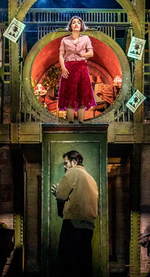Is Light in the Piazza problematic?
Alex Kulak2
Broadway Legend Joined: 9/11/16
#1Is Light in the Piazza problematic?
Posted: 11/29/18 at 7:07pm
I was recently called back for a production of A Light in the Piazza. While re-reading the script in preparation for the role, I was thinking about the character of Clara.
Clara is developmentally disabled due to her accident. While most of the people in the show just view her as kind of scatter-brained, there's several points in the text that clearly point out she is clearly mentally and emotionally stunted.
Therefore, how is it possible for the "happy ending" to be Clara entering a relationship with Fabrizio? Fabrizio, while immature, is still an adult man, in a romantic and sexual relationship with a woman who has the mind of a child. Can Clara give consent in her condition? Even if she legitimately loves Fabrizio, how can Margaret in good conscience allow their relationship?
Afterthought: I know Adam Guettel posts on here from time to time, so if you see this Adam, (1) please don't interpret this as me badmouthing your show or you, and (2), I'd really like to know what your opinion is, or if this ever came up during the development of the show
#3Is Light in the Piazza problematic?
Posted: 11/29/18 at 9:12pm
Being disabled mentally / having development issues (resulting from brain trauma, in this case) is a wide spectrum. Meaning, no two people are 100% alike with their disabilities, when it comes to disabilities such as this. For example, I was born with quite a bit of white brain matter (that means blank spots in the brain) at birth, due to being 2.5 months premature. The doctors told my mother that I would most likely grow up to be extremely slow, with a low IQ, and they tried to kindly tell her that I'd probably be... stupid, essentially. Well, I have an IQ of 140 and was reading and writing by a very early age, and, I went to a good college that was fully funded to me by grants due to having an extremely high GPA. Now, that being said, only the people who are living with mental issues / development issues / brain trauma can know how much they can or cannot do something. Someone with brain trauma and development issues may very well be too stunted to fully consent, but, someone else also in the same situation may very well be able of such things. We can't fully know because we aren't in the minds of the people who have those issues. It's a very personal thing and brain trauma and how it affects someone can be a wide spectrum that we may not fully be able to grasp. However, I will say that her ability to love, to be in love, and to want to get married should be a testament of her sexuality and how comfortable she'd be with consenting. Being physical with someone who you love is just another expression of love - it's a physical expression of love. So, if she's in love with him, wants to marry him, etc. then she already feels that love inside her heart. Any physical acts between them would just be a physical manifestation of their love, so, that's one way to look at it.
#4Is Light in the Piazza problematic?
Posted: 11/29/18 at 9:28pmI've never really viewed the ending as being a happy one. Margaret is clearly extremely conflicted up until the very end, as we hear in "Fable". I mean, she basically spends the entire show trying to prevent them from being together, but she fails. How can she prevent her daughter from love? Still, I don't think you're supposed to walk away from that show feeling 100% happy that Fabrizio and Clara end up together.
#5Is Light in the Piazza problematic?
Posted: 11/29/18 at 9:38pm
If it wasn't "problematic" there would be no show.
#6Is Light in the Piazza problematic?
Posted: 11/29/18 at 10:03pm
“Fable” is basically Margaret letting go of her cynicism about love, and allowing Clara and Fabrizio (who still barely know each other) all the happiness in the world, even though she knows they are likely headed for trouble once Fabrizio realizes the extent of her, um, childishness.
It’s one of my favorite musicals, but it lost to Spamalot at the Tonys because some people are really uncomfortable with the subject matter. In modern day America, legally speaking, Fabrizio would technically, unknowingly be committing statutory rape by marrying and sleeping with Clara because she has a major cognitive disability. But things were different in the 1950’s.
#7Is Light in the Piazza problematic?
Posted: 11/29/18 at 10:19pm
Are you saying that a young woman like Clara could never consent to sex? That's also problematic, no?
#8Is Light in the Piazza problematic?
Posted: 11/29/18 at 11:03pmI’m just going by the law. I’m not saying I agree with it when it comes to cases like Clara’s.
#9Is Light in the Piazza problematic?
Posted: 11/29/18 at 11:52pm
Aren't non-problematic shows just boring?
#10Is Light in the Piazza problematic?
Posted: 11/30/18 at 12:30amThe Light in the Piazza is a tragedy. It’s not a happy ending. It’s very sad knowing that this whole thing will fall apart soon. A similar ending happens in “the graduate.” It is supposed to be upsetting for the audience. That is why it is scored with sad music.
#11Is Light in the Piazza problematic?
Posted: 11/30/18 at 2:39am
The Distinctive Baritone said: "I’m just going by the law. I’m not saying I agree with it when it comes to cases like Clara’s."
She fell in love with him and yes was able to consent. He didn”t manipulate her into sex and it”s not as if people with these kinds of disabilities can”t ever be legally able to consent with sex.
#12Is Light in the Piazza problematic?
Posted: 11/30/18 at 4:28amPeople with disabilities can give consent. Margaret sees that Clara has the capacity to love. Clara falls in love and everything within her relationship with Fabrizio is concensual. Nothing in the musical is problematic in this sense.
EnochShow
Swing Joined: 11/30/18
#13Is Light in the Piazza problematic?
Posted: 11/30/18 at 8:00am
I think part of what is interesting about Clara in LITP is that we don't really know the extent of her injuries... Does she behave the way she behaves partly because her mother and father have treated her as if she IS unable to function on her own? I'm not sure.
One thing I find interesting as the show progresses is that Clara very quickly starts to pick up Italian. is this because she has a "young mind" and can learn quickly? Or is it because she is actually very smart?
Another thing that one may notice is that towards the beginning of the show, Clara has a "melt-down" and must be soothed by her mother. By the end of the show, she is able to calm herself down (after her beautiful run across upstage). I think there are many small examples of this throughout if you look close enough.
It seems to me that Clara grows VERY MUCH throughout the show. This "growing" coincides with breaking away from her mother. Has her mother been smothering her and limiting her all these years? Could Clara behave the way she does just because she's expected to and treated as if she should behave that way? It's a thought.
On a different note - I'd love a revival of this with NIkki Renee Daniels and Audra McDonald. ![]()
#14Is Light in the Piazza problematic?
Posted: 11/30/18 at 8:24am
MadonnaMusical said: "The Light in the Piazza is a tragedy. It’s not a happy ending. It’s very sad knowing that this whole thing will fall apart soon. A similar ending happens in “the graduate.” It is supposed to be upsetting for the audience. That is why it is scored with sad music."
Hm, I can't agree with this at all. The music at the end of Piazza doesn't sound even a little tragic to me; it sounds as if Margaret has arrived at a state of peace and cautious optimism about Clara's future.
On the OP's question, I'll echo what others have said: the musical is very much about Margaret struggling with a version the exact question you're asking, and slowly deciding that Clara should be able to make her own choices.
#15Is Light in the Piazza problematic?
Posted: 11/30/18 at 8:34am
For the longest time there's been an "autism taboo" about depicting this specific neurodevelopmental condition by name or with any specificity. It's only starting to break now- although The Big Bang Theory will still notoriously not say "autistic" or "asexual," nor would Community in its heyday- but I've noted several musicals written in ways that suggest certain characters are either implied to have autism or have more fanciful conditions standing in for autism. Working in a medical field, "kicked in the head by a pony" sounds like a fanciful 1950s invention of a justification for a character who wasn't "coo-coo crazy" but was just "born that way," written in an era when neurodevelopmental disorders were less well-understood.
See also: Leaf Coneybear in "Spelling Bee," who exhibits chronic self-stimulating behavior and is clearly coded as special needs (to the point of wearing a helmet for his own protection), and Tommy Walker in "Tommy," whose less-messianic/supernatural interpretation in the Des McAnuff staging seems to suggest an allegory for mental health, rather than for Eastern religion.
#16Is Light in the Piazza problematic?
Posted: 11/30/18 at 8:56am
Having been in the show and been part of the final scene like fifty times, I always felt it was “bittersweet” as they are happy now, but like Margaret, you know it may not last.
Anyway, I don’t think it’s a “consent” issue. The concern for the audience is whether Clara will be able function as an adult (and mother), and if Fabrizio can handle it once he realizes the truth.
#17Is Light in the Piazza problematic?
Posted: 11/30/18 at 9:58amFor Clara and Fabrizio, it’s not a bittersweet ending; they’ve found each other (“this is love to me,” he sings). But the story is told through Margaret’s eyes and her journey of acceptance of love and her daughter doesn’t end until the very last chords of the music. The climax of “Fable” is, of course, the moral of the fable: “If you find in the wide, wide world that someone sees, that someone knows you, love if you can, oh my Clara, and be loved.” Of course, Margaret having been love scorned sings “May it last forever” over mysterious, eerie music, but then ends on hope with her final “Clara, the light in the piazza” a phrase that extends musically in the orchestra but lands on a very harmonious chord. There’s nothing tragic about it, at least not from a musical standpoint. Dramatically, it can be staged or directed to make it seem ominous, but it’s not an ominous ending as written (and as I remember it being originally staged).
Fosse76
Broadway Legend Joined: 3/21/05
#18Is Light in the Piazza problematic?
Posted: 11/30/18 at 1:33pm
HeyMrMusic said: "People with disabilities can give consent."
Depending on circumstances and the extent of the mental impairment, a court may likely need to intervene. to either to affirm or deny the independence of the individual impaired.
#19Is Light in the Piazza problematic?
Posted: 11/30/18 at 3:19pmAs Clara is written in the musical, she can (and does) give consent.
#20Is Light in the Piazza problematic?
Posted: 11/30/18 at 4:13pm
Personally I tend to focus on how the last few chords of 'Fable' match the tune of Clara singing the words "My love" at the end of the title song. I think the show, without stating it outright by having Margaret sing those words, is focusing on Margaret's love for Clara as the 'true' love story of the show at the very end.
My current thinking on the show is that, to some extent, Clara's and Fabrizio's relationship, and its likely success, is beside the point of the show (although in real life, of course, questions of consent are vital). The show is more about Margaret deciding, like many a parent, that despite Clara's difficulties, Clara should go out into the world and have experiences and make choices, even if they're sometimes risky or wrong. 'Tis better to have loved and lost, etc. Clara's title song is a 'poetic' way of showing us that she understands and consents as much as she possibly can. In the original novella, IIRC, we never get to hear Clara's direct perspective on the situation, so adding it was probably a deliberate creative choice to help modern audiences get on board with the plot.
All of which works in a vague artistic way, but I can certainly understand that realistically speaking, going from being overprotective to letting your developmentally challenged daughter marry a virtual stranger across the globe, may be overshooting the mark a bit. I go back and forth on it myself with this show. A less romantic but more acceptable conclusion would be Margaret convincing Fabrizio to agree to a longer engagement, then inviting him to stay with the family in America for a few months to get to know 'everyone' (ie, Clara) better, or something along those lines.
ScottyDoesn'tKnow2
Broadway Legend Joined: 1/22/14
#21Is Light in the Piazza problematic?
Posted: 11/30/18 at 4:20pm
Alex Kulak2 said: "Afterthought: I know Adam Guettel posts on here from time to time, so if you see this Adam, (1) please don't interpret this as me badmouthing your show or you, and (2), I'd really like to know what your opinion is, or if this ever came up during the development of the show"
Considering his tweets, I wouldn't trust Guettel to provide any real insightful commentary about female consent unless you want to hear some regressive stuff just to refresh your brain on some backwards ways of thinking that people still buy into in 2018.
ETA: I just found out he deleted his twitter account. Maybe he was asked to in light of the show premiering in London with Renee Fleming.
DCS
Featured Actor Joined: 3/19/08
#22Is Light in the Piazza problematic?
Posted: 11/30/18 at 4:24pmI was very familiar with the original film before I saw the show on broadway and was baffled by a significant plot point from the film that was missing from the musical. It's very clear in the film, from Margaret's phone calls home to her husband, that he plans to have Clara instituonalized as soon as they return home from the trip. This plot point really explains margaret's acceptance of clara's relationship with fabrizio since it is rescuing Clara from spending the rest of her life in an institution. I wonder why this was left out of the musical since it provides much more depth to margaret's motivations.
#23Is Light in the Piazza problematic?
Posted: 11/30/18 at 4:32pm
It’s one of my favorite musicals, but it lost to Spamalot at the Tonys because some people are really uncomfortable with the subject matter.
Really? That's why the majority of voters selected Spamalot for Best Musical? Because an unknown percentage of them were "uncomfortable" and simply tipped the scale in Spamalot's favor? You make it sound like the voters have never experienced dramatic musicals before in their nearly century-long existence in musical theatre history. Somehow, it sounds like a convenient, and rather lofty, excuse to try and justify a decision you don't particularly like. Sometimes if has nothing to do with their comfort level on the subject matter. In fact, it's much more likely that the majority of them enjoyed Spamalot more than Piazza and it's really that simple.
#24Is Light in the Piazza problematic?
Posted: 11/30/18 at 4:47pm
Yeah, I have never heard the "Piazza lost because it made people uncomfortable" narrative. In fact, I cannot say I have ever heard anyone express Piazza made them uncomfortable because of its subject matter.
ScottyDoesn'tKnow2
Broadway Legend Joined: 1/22/14
#25Is Light in the Piazza problematic?
Posted: 11/30/18 at 5:11pm
A friend of mine had a strong reaction to The Light in the Piazza, but not because she was uncomfortable with the subject matter or anything like that but because she felt she had to sit through some characterless music and seeing characters go through an idiotic plot.














